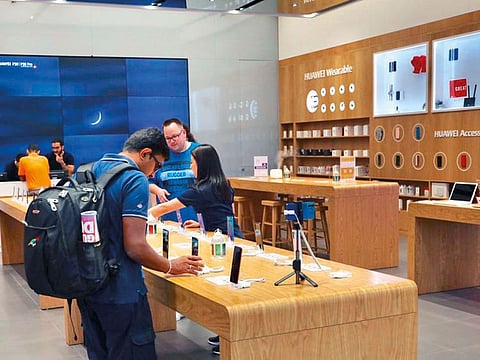UAE tech retailers confident of Huawei sales for now
Likes of Jumbo and Sharaf DG say there will be no after-sales issues with current devices

Dubai: Huawei smartphones are unlikely to be affected by recent controversies that have embroiled the Chinese manufacturer — and that’s according to UAE tech gadget retailers.
Google was forced to cut ties with Huawei after the US issued a ruling forbidding companies in the country from working with the smartphone maker amid a wider fallout between China and the US. None of the handsets currently on sale would be impacted by this, members of staff at both Jumbo Electronics and Sharaf DG told Gulf News.
They cautioned, however, that it may affect future models. Experts say that Google — which produces the Android operating system found on Huawei smartphones — may be forced to restrict their software on future devices. “None of the items in the market will be affected,” said one customer services representative at Sharaf DG, adding: “But it will affect the ones currently being manufactured.”
A representative from Jumbo Electronics echoed this, saying that future models may be affected. Both companies said they had no intentions to stop selling Huawei phones.
“Huawei will continue to provide security updates and after-sales services to all existing Huawei and Honor smartphone and tablet products, covering those that have been sold and that are still in stock globally,” Huawei said in a statement to Gulf News. (Honor is the budget smartphone brand within the Huawei portfolio.)
Spokespeople from Sharaf DG, Jumbo, and Virgin Megastores all declined to comment for this story.
But if the issue does not get resolved within three months, tech analyst Vineet Shrivastava told Gulf News, local retailers would “absolutely” begin to consider dropping Huawei products. “Big-box retail runs at low single-digit margins and they can’t afford the hit,” he said.
Many markets have already seen large drops in the prices of Huawei phones as a result of the controversy. In the event that retailers do begin to cease stocking the company’s smartphones, Huawei is unlikely to have a fallback option for retail distribution globally, Shrivastava said.
“China would make the most sense for direct online selling for instance, but in other places the challenge is the viability of the actual product rather than sales channels.”
Ultimately, he said, the situation came back to the resolution of the ban itself, as opposed to temporary patches.
“There will be next to no future in this industry [for Huawei] without a total or partial repeal of the ban, likely as part of a larger agreement.”
If the ban stays as it is, however, it would require an “unprecedented level of vertical and horizontal integration in Huawei’s consumer electronics division, of the sorts not seen in even Apple or Samsung.”
This would range from hardware components such as chips, to more difficult projects like software ecosystems and perpetual software development.
“At a time when companies like Intel and Microsoft are conceding ground and quitting segments of seemingly core competence, like 5G modems and mobile software ecosystem respectively, it is not really feasible for Huawei to succeed against even greater odds,” Shrivastava said.
This is assuming that the replacement OS is based on open source Android, he said, a route explored previously by Amazon and others.
Even if Huawei were to continue producing smartphones with its own homemade operating system, he said, the ban would “effectively end Huawei’s consumer electronics aspirations”.
Last week, the UAE’s federal telecoms regulator TRA said that Huawei had confirmed to it that all its products being sold in the UAE, including its stock in warehouses, would not be affected by recent developments. “It stated that all apps and their security updates on Google Play are available without any issues.”



